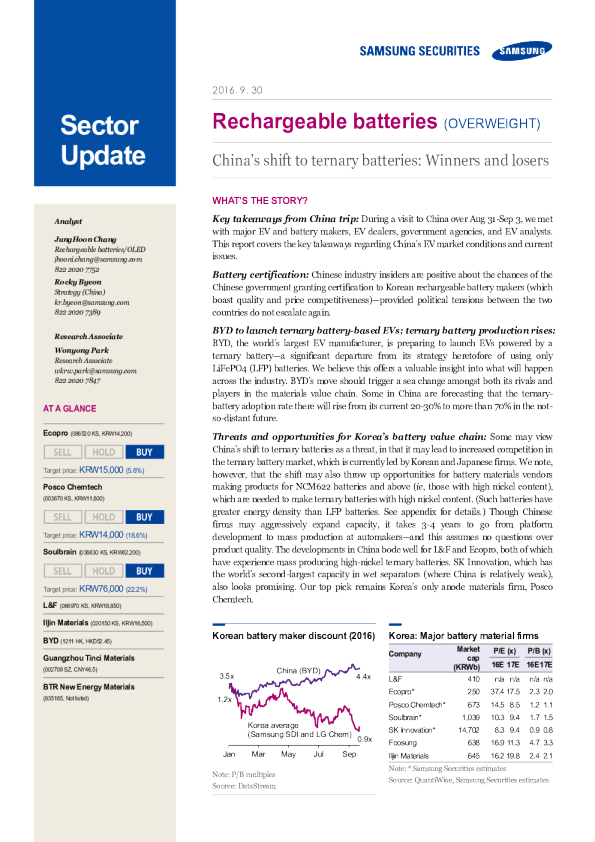Adjusting to new risk-free rates, and soon to policy shift (December 2016)

Deutsche Bank Markets Research Global Emerging Markets Consumer Periodical Latam Consumer Monthly Date 13 December 2016 Adjusting to new risk-free rates, and soon to policy shift (December 2016) Post-election selloff not limited to Mexico ________________________________________________________________________________________________________________ Deutsche Bank Securities Inc. Deutsche Bank does and seeks to do business with companies covered in its research reports. Thus, investors should be aware that the firm may have a conflict of interest that could affect the objectivity of this report. Investors should consider this report as only a single factor in making their investment decision. DISCLOSURES AND ANALYST CERTIFICATIONS ARE LOCATED IN APPENDIX 1. MCI (P) 057/04/2016. Jose Yordan Research Analyst (+1) 212 250-5528 jose.yordan@db.com Katina Metzidakis Research Associate (+1) 212 250-2009 katina.metzidakis@db.com With only a few exceptions, Latam consumer stocks suffered double-digit declines in USD terms in November after the US election sent discount rates up ~50 bps (with the 10-year UST yield now expected to exceed 3% next year). Retail, HPC, and Beverage subsectors fell 16.6%, 16.2% and 13%, respectively, while Food fell 4.1%. Only 7% of our covered stocks showed positive returns (versus 72% the prior month), while 24% outperformed their respective indices (vs. 21% in October). The only stocks with positive returns (and double-digit outperformance) were MRFG3 and BEEF3, on a more positive 2017 industry outlook. Year to date only 5 of our covered stocks (17%) have outperformed. Among covered Mexican names, reaction was surprisingly uniform Our Mexican covered stocks all underperformed the local IPC index (which fell 13.6% in USD terms), as expected. But the percentage declines surprised us in their uniformity. Below is the list of companies we included in our last Monthly (in which we ranked the sector in order of vulnerability to MXN devaluation): 1-KIMBERA (95% Mexico revenues, 60% USD costs); down 19% 2-LIVEPOLC1: 100% and 18% (disclosed) imported merchandise; down 25% 3-SORIANAB: 100% and 3% (estimated) imported merchandise; down 19% 4-WALMEX: 85% and 2% (disclosed) imported merchandise; down 13% 5-CHDRAUIB: 72% and 2% (disclosed) imported merchandise; down 18% 6-FMX: 66% and estimated 5% dollar-linked costs (in Mexico); down 18% 7-AC: 56% and estimated 20% dollar-linked costs (in Mexico); down 15% 8-KOF: 45% and estimated 20% dollar-linked costs (in Mexico); down 17% 9-BIMBOA: 32% and estimated 55% dollar-linked costs (in Mexico); down 16% 10-GRUMAB: 26% and estimated 55% dollar-linked costs (in Mex.); down 15% We expected more variation given the difference in Mexico exposure between the top and bottom of the list, so the difference of only four percentage points was surprising to us, as were the outliers LIVEPOLC1 and WALMEX (which fell too much and too little, respectively, in our view). After January 20, we would expect greater variation as actual policy changes toward Mexico get unveiled and we gain greater clarity on the related impact on specific stocks. After October positive surprise, Walmex Mexico comp sales got back on trend After Walmex Mexico comp sales significantly surpassed market expectations in October, they went back to a more moderate trend in November with SSS growth of 5.8%, slightly above DBe (5.5%) and a bit below Infosel consensus (6.2%). November’s calendar was negative in terms of weekend days, so the headline number was lower than the 4-week comparable sales growth (8.2%, which was not far from the year-to-date average). For Central America, SSS grew 3.4%, and the 4-week comp sales grew 7.8%. SICOBE: Brazil beverage production still falling (data not available after 2016) According to SICOBE, November beer production fell 3.7% year-on-year, while soft drinks fell 10.0% after rising only once in the past 22 months. For beer, comparisons are expected to ease gradually over the next four (summer) months; while for soft drinks they should remain easy (lapping yoy declines) for the same period. As of December 12, 2016 the Brazilian IRS discontinued the SICOBE system because its high cost no longer justifies its benefits (higher tax collection). As a result, this section will no longer appear in 2017. Distributed on: 14/12/2016 03:06:00 GMTDistributed on: 14/12/2016 01:24:20 GMT 13 December 2016 Consumer Latam Consumer Monthly Page 2 Deutsche Bank Securities Inc. Table Of Contents DB Related Research—November....................................... 6 Latin America: 3Q16 earnings notes; estimate/target updates post US election 6 Global: 3Q16 earnings notes and company updates; US staples outlook in a rising rate environment ..................................................




